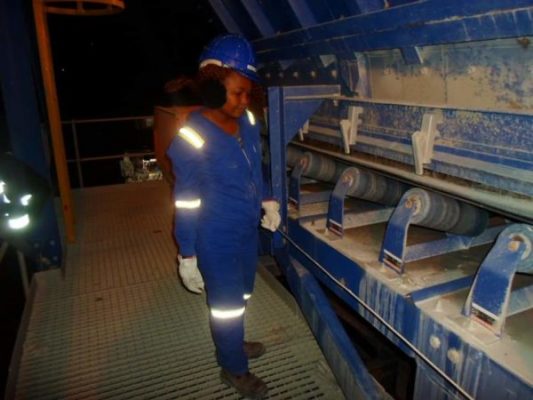The ailing economy and the unrestrained rise of poverty saw a great number of women finding their way into mining and as the economic conditions continue to take a turn for the worst a lot more women are getting involved in the mining industry.
By Sharon Tsuro
However, due to the various obstacles, women are struggling to be accepted into the sector. Their challenges revolve around societal opinions on gender equality, exploitation, lack of financial capital, equipment and tools, legal and policy restrictions and lack of adequate support from the government. In an era where Zimbabwean women in their numbers are getting relevant training in the mining sector, this article serves to discuss ways in which young technical women can be incorporated into the industry.
The patriarchal nature of the Zimbabwean society demeans the mindset, physique and general capability of a woman. According to Dreschler (2001), cultural barriers impose a heavy burden on women, as a result, limiting their mobility and ability to start up and run their own businesses. They are generally believed to be the weaker sex but the question one would be prompted to ask is, what kind of strength does one need to make it in the mining industry and what evidence is there to prove that women do not have what it takes to survive in the industry? Women now constitute approximately fifty percent of small-scale miners in Zimbabwe (Dreschler; Hoardly and Limpitlaw, 2004). The likes of Mrs. Evans Majola (Founder of Mthandazo Women’s Mining Centre in Collen Bawn Gwanda) and Mrs. Sthembile Ndlovu (Chairperson) are examples of women who are making it in mining.
Henceforth it is of paramount essence to educate society and make them believe that women are capable and can be trusted to do well in the mining industry. This can be done through social media platforms, national television, newspapers, and magazines. The society needs to get used to the fact that it is not an inconvenience or an anomaly to have women working in the mines. Accepting women in the industry actually guarantee economic growth and help alleviate poverty.
It is commendable that the government allowed small scale miners to sell to Fidelity Printers. In 2016, they set up a loan facility to anchor the production of gold by artisanal miners (The Gold Development Initiative Fund). Sadly, the government served only twenty-million out of the one hundred and fifty million fund for the female miners. This included money for training at Zimbabwe School of mines. This goes on to show that even the government has little confidence in women who are in the mining industry. There is a lot more that the government can do to support young women in the mining sector. In an interview done by the Global Press Journal, a spokesperson for Fidelity Printers said distribution of funds had been poor and only ten percent of the twenty million had been given out at that time. The authorities need to start supporting women not only theoretically because they are also the future of this nation and thus, but they should also be given enough resources that will enable them to compliment the men in resuscitating the economy through the exploitation of minerals.
The exploitation of women by men in the mining sector needs to stop. In as much as women may want to be included in the mines, no living being can tolerate abuse especially if it’s gender-based. Women have complained of being sexually assaulted by men who only see objects meant to satisfy their physical needs whenever they feel like. In other instances, women are forced to surrender the proceeds of their labor to men who bully them around. According to Sophia Takuva (Secretary of the Zvishavane Women Miners Association), Amid all the talk of land plots, machinery and earnings at ZWMA, there is always an unspoken problem that haunts the discussions in the group. Women are harassed and abused by men at all stages of the mining process. She said, “Many women we know have experienced it, its just one of those things that are difficult to talk about.” In order to make the mining industry a better place for the women, stern measures should be put in place to discipline offenders and women should be encouraged to speak up about abuse. Women need to know that the mining industry is not a male territory and that they have rights.
After graduating, young women can only dream of getting employed let alone start their own mining businesses. The lack of financial capital is the deadlock to the brilliant minds of these women. This has been worsened by their subordinate position in society. Financial institutions are allowed to give out loans to everyone regardless of gender but women still remain victims of distrust. According to (Maramba 1998), most financial institutions will not grant loans to women unless the husband supports the application. This proves to be very hard on the young technical women who would have finished their courses but are either unemployed, don’t have assets to use as collateral or are single. Women need more organizations that will have enough confidence in women to be able to fund them.
The legal and policy measures are a stumbling block for women who would wish to penetrate the mineral exploiting department. The process of acquiring a mining license is not inclusive and it takes way too long. There have been complaints of women who wait for years before they can start working legally. Some of the costs needed to acquire the necessary documentation are way too steep. In order to curb this, the Mines and Mining Development Ministry needs to make the process faster and easier for those that want to invest in Zimbabwe’s mining industry.
In a nutshell, young technical women need a society, government, and financial institutions that believe that they are more than capable of working with men in the mining sector. The media is a major source of definitions and images of social reality (McQuail1994:1), therefore it should be used to change archaic beliefs about what women can and can’t do. Given a fair chance woman can help create a better Zimbabwe.
Written by Sharon Tsuro. Sharon is a Metallurgy graduate from the Zimbabwe School of Mines and she
writes in her own capacity. She can be contacted via email on [email protected]





